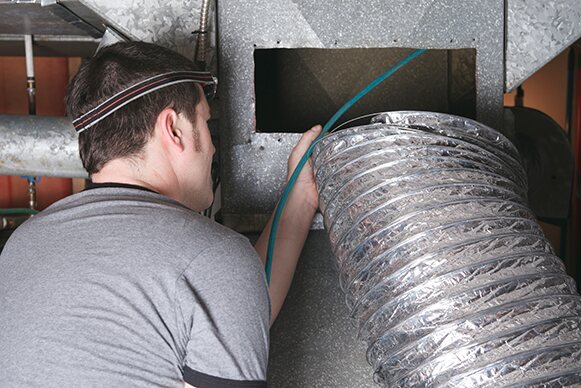You might not be able to see them, but your ducts are one of the most instrumental parts of your HVAC system. They ferry air from the furnace or air conditioner to the heating and cooling vents throughout your house. A well-designed duct system is what allows a central HVAC system to deliver heating and cooling to difficult-to-reach areas throughout your home. Simply put, your ductwork does a lot of the legwork when it comes to maintaining a consistent temperature throughout the home. When the time comes to replace your ducts, though, you might be asking the question of “Can I recycle ductwork?”
Understanding the Hows and Whys of Getting Rid of Old Duct Components
 Before we delve into the question of whether recycling ductwork is advisable or even possible, let’s look at why you would need to get rid of old duct components in the first place. After all, when most of us think of HVAC issues, we think of problems with the furnace or the air conditioning unit itself—not with the ducts. Because ductwork is ‘out of sight and out of mind,’ hidden beneath the floors or in the ceiling, it’s possible to go years without even thinking about your ducts.
Before we delve into the question of whether recycling ductwork is advisable or even possible, let’s look at why you would need to get rid of old duct components in the first place. After all, when most of us think of HVAC issues, we think of problems with the furnace or the air conditioning unit itself—not with the ducts. Because ductwork is ‘out of sight and out of mind,’ hidden beneath the floors or in the ceiling, it’s possible to go years without even thinking about your ducts.
Just like any other component of your HVAC system, though, ductwork can fail over time. Years of air coursing through your ducts can result in holes or cracks forming in the ducts. Different sections might start coming loose from one another, thus leaking hot or cold air and reducing the efficiency and effectiveness of your system. If anything falls on the top of your ductwork, it can become dented or kinked. Even ducts that don’t bear the brunt of any structural damage can end up partially clogged by dust, dirt, pet dander, or even mold.
Any of these situations might prompt you to replace your ductwork. Watching, listening, and smelling for the signs of damaged ductwork is something you should constantly be doing to ensure the health of your HVAC system and your family. Look for holes, tears, or cracks in any exposed ductwork. The basement is usually the best place to go if you want to have a look at the ducts themselves. Listen for rattling, whistling or howling coming from the ducts. Pay attention if your home seems dustier than usual, or if you smell mildew on the air. Finally, note any inconsistencies in temperature throughout your house. If one part of the home is no longer heating or cooling as effectively as before, there’s a good chance that a failing duct is the culprit.
If you do notice an issue with your ducts, you have a few options. Some ducts can be repaired, reattached or resealed. Others can be cleaned and rid of impurities such as dust or mold. Others will need replacing altogether. Contacting an HVAC professional will help you identify the best strategy to take with your ductwork.
Can I Recycle Ductwork? Learning How to Dispose of Old Duct Components
If your ductwork does need replacing—either just pieces of it or the entire system—you should investigate recycling it. Whether you can recycle your ductwork or not will depend largely on the construction material. Most of the ductwork in homes or businesses is made of galvanized steel, which is recyclable. Stainless steel and aluminum are the other metals you will commonly find in duct components. These materials can also be recycled.
Furthermore, you might be able to get some money for your ductwork. Steel and aluminum are both classified are non-ferrous metals, which, like other metals in this category (copper, brass, bronze), are worth a fair amount of money to scrap yards.
To recycle your ductwork, do a Google search for scrap yards in your area. Even in most small towns or rural areas, you should be able to find at least one scrap metal recycler. Make a list of the scrap yards you find and call them to ask which metals they accept, whether they pay for scrap metal, and what the process is for recycling your ductwork. Some scrap metal yards are willing to come to pick up your scrap, while others will want you to bring it to them. In any case, doing some research and making a few calls should help you find a convenient (and potentially profitable) way to recycle your ductwork.
Don’t Throw Your Old Ductwork Away: Stay Green and Recycle
Not only is throwing away scrap metal wasteful, but there’s also a good chance that your standard garbage delivery service won’t take your old ducts. Trying to recycle the metal through local scrap yards is a greener option and might even make you some money. So, pick up the phone today and start asking the question: “Can I recycle my ductwork?” You should have no problem finding someone who will view this trash as a treasure.
Valley Comfort conducts Heating, Ventilation and Air Conditioning Services in the following communities: Santa Rosa, Napa, Rohnert Park, Healdsburg, St Helena, Calistoga and Windsor


